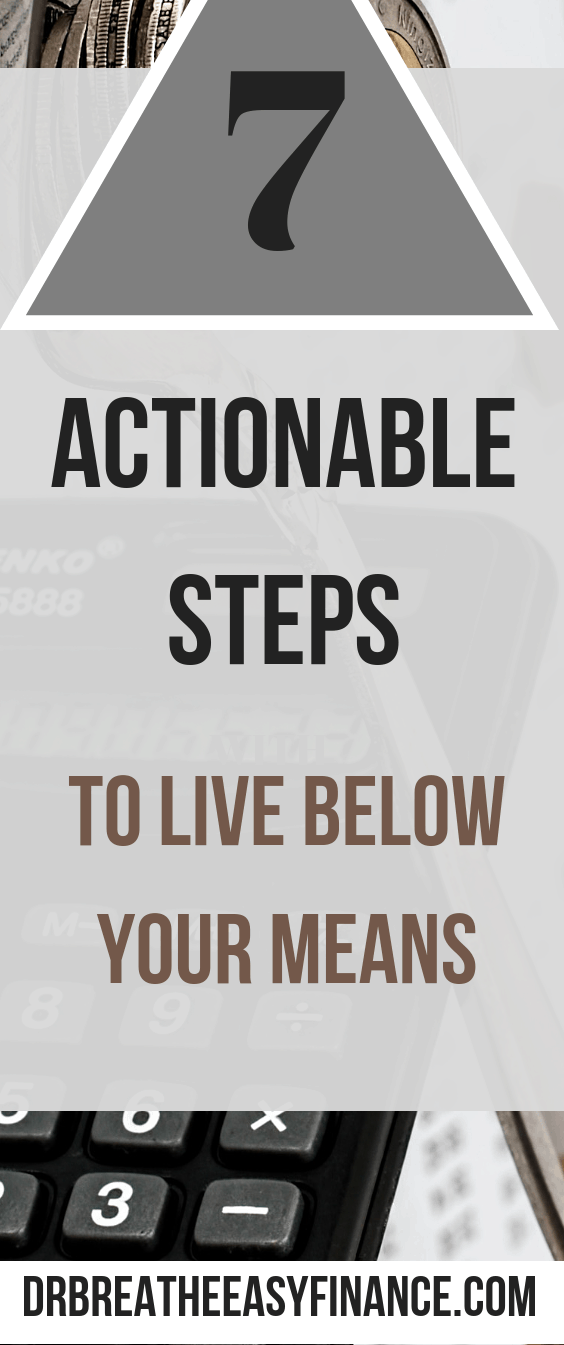Table of Contents
7 tips for living below your means
This is my first dab at guest post and I am excited to share this awesome piece of article. My guest is Lance from Financially Free Society. He focus on business tips, entrepreneurship, stock trading and general personal finance. Please check him out.
Note: The opinions here are the ones expressed by my Guest.
Note: Check disclosure page to know about affiliate links.
We all know what it means to live below your means. It simply means that you do not spend everything you make. In fact, if you are trying to live below your means, you should make a conscious effort not to spend all of your income. It is a well known fact that most Americans cannot afford a $500 surprise expense, and it is also a well known fact that the average american household has around $140,000 of debt. When you live below your means, all of the aforementioned problems become trivial. Living below your means allows you to avoid financial stress and it can assist you in achieving financial freedom. Below I have outlined several tips that will assist you in your effort to live below your means. Take a look!

Pin Me
1. Track your historical spending:
Recently, I calculated my YTD income, expenses, savings, and investments. I then put all of them into a spreadsheet using google sheets, and I made a line graph depicting my month to month financial habits. Doing so has really shown me where I spend my money, how I save it, and how I invest it. Yes, it took quite a while to calculate all of this (about 3 hours), but it was well worth it.
Tracking your financial habits will really assist you in the long run. It will make clear to you what habits are helping you towards your goals and what habits are not. If you are trying to live below your means, then you simply have to start tracking your spending habits. I also recommend tracking your other financial habits while you are at it.
Addition by Dr Breathe Easy Finance – I track our spending and investment with Personal Capital. You can try them out (Affiliate application pending).
2. Create a personalized budget based on that spending
Once you have tracked down every last bit of your spending, make a budget. Now, do not make a budget with the typical categories. Budgets like that are useless because they do not show you where your money is really going. For example, I used to use a misc category in my budget. As I tracked my monthly expenses, I realized that a lot of them were going into this category. I couldn’t actually tell what I was spending my money on, so I decided to get rid of this category. I then made categories that related to my spending.
For example, I made a personal development category for books and classes, and I made a running category for races and clothing. I have more categories than this of course, but I just wanted to show you how detailed you need to be in order to get an idea of your spending.
You can download my budgeting Ebook from the homepage. It is free and it will get you started on a solid foundation. Other budget related posts here from Mrs Breathe Easy Finance.
3. Eliminate unnecessary expenses
If you are going to live below your means, you need to eliminate unnecessary expenses. An expense is unnecessary if it is not needed or is undesirable. For example, if you can walk to work and save gas, then you should walk to work. Another example may be that you buy clothes that you do not need. Honestly, I cannot stand the latter. I personally only have 2 pairs of regular pants and 2 pairs of dress pants. Regardless, eliminating unnecessary expenses will lower your monthly expenses and it will help you take control of your spending. Here are 25 ways to save money and most of them include cutting down unnecessary spending like cable.

PIN ME, I AM BEAUTIFUL
4. Avoid Debt
Debt will put an end to your plans to live below your means. The entire point of debt is to make purchases that you cannot currently afford. Debt can, and has, ruined lives, and I honestly loathe it. Do not use debt to make purchases unless it is a necessity. Purchases become necessities only when the lack of the purchase will affect your life in a extremely negative way. An example of this may be the use of a credit card to purchase groceries after you have been laid off.
Yes, I am not entirely against the use of credit cards. I actually use mine for cash back rewards all of the time, but I also pay my card off every week. I never use my card for purchases that I know I cannot afford, and neither should you. If you are going to use a credit card, use one that offers cash back rewards. Doing so will allow you to recuperate some of your expense. Only use this strategy if you know you can pay off the card.
Now, I am sure you are wondering about whether or not you should use debt for cars, homes, or even starting a new business. In reality, this depends on your ability to pay off the loans. I do not think you should use debt to purchase a car. Cars are not typically necessities. In regards to buying a home, I personally do not want to use debt to purchase a house. This is because I believe I can save enough to buy one outright like so many have in the past. If you have found the home of your dreams, and it is within your ability to pay it off at a fast pace, then you can consider using debt to buy your home. DO NOT BUY A HOME YOU CANNOT AFFORD. If you are using debt to purchase a home, make sure you can actually afford to pay it off. In fact, if you go this route, buy a home you can pay off rather quickly.
In regards to using debt to fund a new business, I do not recommend doing it. I have started several business without the need of debt. The problem with using debt to fund a business lies within the uncertainty surrounding a new business. It is a sad reality, but most new businesses fail. If it fails, you may end up with a mound of debt you cannot pay off quickly. If I were you, I would avoid using debt to start a new business.
Go ahead, pin this image and subscribe

Pin Me
5. Find low cost hobbies:
Everyone should have a couple of hobbies to keep them occupied in their free time. I have quite a few that I frequently partake in. I recommend that you try to find hobbies that are relatively low cost. Doing so will allow you to keep more cash in your pocket, and it will assist you in your efforts to live below your means.
My fiancé and I recently took up a couple of free hobbies to keep us from spending our hard earned dollars. Some of them include geocaching, regularly taking our dog to the park, and playing board games. The last one does require a small amount of money in the beginning, but once you buy the game, it is yours to play whenever you‘d like. Anyway, I suggest you look for low cost hobbies in order to reduce unnecessary spending associated with entertainment.
6. Avoid Eating Out
It amazes me how much people spend on food every month. Seriously! Next time you are with a close friend, try asking them how much they spend on food every month. I am sure the number will shock you. Outside of groceries, you should try to avoid spending money on food. Try to cook more at home and make sure to pack a lunch for work. Doing so could potentially save you hundreds of dollars every month, but this depends entirely on your eating habits.
7. Pay Yourself First
If you take anything away from this article, let it be this suggestion. Try to automate your saving/investing, and pay yourself first! What this means is that you save or invest before you spend money on anything else. I even recommend doing it before you pay your monthly bills (assuming you do not live paycheck to paycheck). If you start paying yourself first, your savings account will begin to grow. You can then invest the money and grow your income. After a while, paying yourself seems like a typical monthly expense. Eventually, you may not even know what you were spending your money on before you started doing it! You simply have to implement this wealth building strategy. It will help you live below your means because you will not spend the money on unnecessary expenses, and it will help you build wealth. How cool is that?
Conclusion:
I hope that you have found this article useful and insightful. Living below your means is not an easy task for some, but it is possible to adapt if the aforementioned tips are implemented. If you have additional suggestions, make sure to share them in the comment section! Cheers!
There you have it. Actionable steps you can take today to live below your means and move closer to financial independence. Don’t forget to check out Financially Free Society.
Please subscribe to join other 31,000 readers at the time of this post. Personal finance tips and actionable steps to spend less, save more, earn more and invest will be delivered fresh into your inbox after every post.
Don’t forget to Pin, comment and share. We are encouraged when you do so.
I am a pulmonary and critical care doctor by day and personal finance blogger/debt slaying ninja by night.
After paying off close to $300,000 in student loan debt in less than 6 months into my real job, I started on a mission to help others achieve the same. There is no magic to this than to strap up and get it done. Some of the ways we achieved this include side hustle, budgeting, great negotiation skills, and geographical arbitrage.
When I was growing up, common knowledge in Nigeria is that there is one thing you cannot trust anyone else with, and you guessed it – your money.
Being frugal came easily to me based on my background. However, the concept of building wealth did not solidify in my mind until when I finished medical school. I wish I knew what I know now when I was 14. Still, I don’t know enough and I am constantly learning to improve my knowledge.
My goal is to reduce financial illiteracy among young professionals. I am catering to the beginners – babies and toddlers in financial literacy.








xrayvsn says
Great start to your blog for guest posting.
You will never be able to accumulate wealth until your household has positive cash flow and you invest/save the difference. The only way to accomplish this is by spending less than you earn.
Very simple concept but so difficult to implement in this society as there is constant bombardment by media to spend and keep up with the Joneses.
admin says
Thanks for encouraging my guest. The formula for wealth is always to make more and spend less. This is soo basic but tough to implement. Social media especially has a negative impact on wealth for the undisciplined.
Melanie says
Dude, four pants!!! How often do you do laundry?
I kid (sort of). But it’s amazing how many people think that they NEED XYZ. I used to be one of them, and when adversity struck, I was in a bad way.
Great post!
https://www.melanie.city/a-bloggers-guide-to-twitter-hashtags-part-iii-the-curse-of-hashtag-spam/
admin says
It is so important to always have that emergency fund and to always have ability to scale down. That way, one can weather adversities more. I hope you are far ahead of the adversity now. Thanks for stopping by. Please grab your budgeting E-book on the homepage.
Sunshine with Savannah says
This is a great post! I love these tips, and try to live by them. I especially like your low-cost hobbies tip; my husband and I have had to put off brewing beer because although we enjoy it, supplies can cost quite a lot. So until we have a home all our own to brew it in, we’ve put a pin in those projects. Thanks for sharing—a very solid guest post to start with!
sunshinewithsavannah.com
admin says
Thanks for stopping by. There is a case to be made for a hobby that makes you happy though. Hopefully, when you reach financial independence, you can resume those fun hobbies. I would love to learn how to brew beer. Don’t forget to grab your free Budgeting Ebook on the homepage.